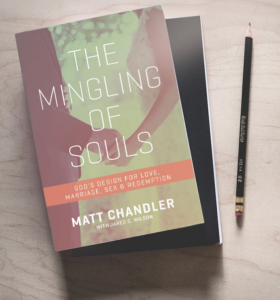Few pastors have had as potent an impact on our lives and marriage as Matt Chandler. This came as an unexpected surprise when I began listening to The Village Church podcast last May. Why? Certainly, Matt is a gifted communicator but that’s not the source of his effectiveness. Many men are gifted communicators, but what makes Matt’s preaching really stick when Selena and I hear it is that he is unquestionably dedicated to one thing: the gospel.
Matt doesn’t water it down or try to repackage Jesus, he just tells people who he is. This uncensored, love-infused version of the gospel is what we strive to communicate whenever we write or teach. We’ve found the alternatives to be exhausting and ineffective. Not to say this is the only way to create blog content, it’s just our way.
The Mingling of Souls
As it turns out, Matt has just released a new book called The Mingling of Souls. We haven’t read it yet, but you can bet we will! Given that we can’t write a book review, I reached out to the folks at The Gospel Coalition to see if we could repost an interview they published. They were gracious enough to allow it, so here it is! Enjoy, I know we did.
What conversations are essential to have prior to engagement? Marriage?
Matt: There are a lot of essential conversations to have before you are engaged. I’m not quite sure that there is a set of essential conversations that should take place between engagement and marriage, but rather that your conversations should continue to build on conversations already had and questions already answered. This takes place by teasing them out a bit more. And by “teasing out” I mean our conversations should be growing steadily deeper as we’re heading toward our wedding day. What we should be looking for is an expanding understanding of each other that’s holistic and rooted in our hopes for serving God alongside one another for life. There are two major categories that I hope my daughters and my son flesh out with their future partners before engagement:
- Theology: What do we believe about God? What role does the Bible play in shaping our view of God? Where will we go to church? What doctrines are non-negotiable for us? This category of theology might sound odd to many people, but what we believe about God deeply matters. If we disagree on who God is or how he’s revealed himself to us, then our relationship at the very center of our covenant will be faulty. How we see the Bible, the church, and the nature and character of God will reinforce the covenant that we make in our vows to each other before God and family.
- Desires: The desire category is also extremely important. I wouldn’t put it on the same level as the theology category, but it’s still vital for our relationships to be healthy. A man once told me that all frustration is birthed out of unmet expectations. If this is true, then before engagement it’s essential to flesh out some of our heart’s desires. Some examples: What do we believe about children? Where do we want to live? How will we spend our money? What are the family dynamics on both sides? There are plenty of other questions, but these are a good start. They should be answered gradually and in the right spaces.
What’s wrong with merely looking for compatibility in a wife or husband?
 Matt: Though it shouldn’t be the only thing we consider, there’s nothing wrong with looking for compatibility in a wife or husband. One of the points I make in the book is that attraction, although a good gift from God, is culturally informed and shouldn’t be trusted as readily as we do. Instead, we should look at character, commonalities, and compatibility. Time and experience have shown me that the attraction piece grows more as time passes. I’d argue that any relationship that has begun with attraction at the center and hasn’t moved past it to considered character and compatibility at all is almost always doomed to failure.
Matt: Though it shouldn’t be the only thing we consider, there’s nothing wrong with looking for compatibility in a wife or husband. One of the points I make in the book is that attraction, although a good gift from God, is culturally informed and shouldn’t be trusted as readily as we do. Instead, we should look at character, commonalities, and compatibility. Time and experience have shown me that the attraction piece grows more as time passes. I’d argue that any relationship that has begun with attraction at the center and hasn’t moved past it to considered character and compatibility at all is almost always doomed to failure.
Has God prepared “the one” for each person to marry?
Matt: Yes, God has prepared “the one” we will marry (though some aren’t called to marriage). That “one,” however, is the person you marry. I know that Lauren is “the one” for me because I asked her to marry me, she said yes, and we were married. I think this idea of “the one” gets really confusing for people because they use it in a way that’s not helpful. It seems as though many singles believe that if they marry the wrong person instead of “the one,” their entire lives and maybe even the history of civilization will be ruined. The reality, though, is that we are to seek out a godly person with whom we can enter into covenant, serve the Lord, and, if he’s willing, have children and raise them to be godly.
You’ve done marriage and relationship counseling for thousands over the years. What’s the biggest issue couples need to address for their relationships to honor God?
Matt: The simple issue is a failure to understand and apply the gospel. I know that sounds cliché. You might even think it’s an oversimplification of real issues. But this is the root cause. Now it’s important to note that a failure to understand and apply the gospel manifests itself in a multitude of ways. The most consistent manifestations are issues related to sex and money. Yet when we dive deeper what we see most often aren’t really issues with sex and money, but a failure to understand our identity in Christ, the role God’s called us to in marriage, and the mutual godly submission the gospel should create. As the result, a husband will punt on his calling to sacrificially love and lead his wife like Christ did the church, and instead fall into the trap of selfish aggression or selfish passivity. Both extremes lead to a breakdown in what God intended the relationship to be and have implications for how the husband will see sex and money. Additionally, the wife, instead of being an expert in the strengths of her husband, will began to tear down, chiseling away and attacking with her words and actions. And his will have massive implications on how she views sex and money. In both of these cases, although the couple will think the issue is sex and money, it’s really a failure to understand the gospel and its implications.
What would you say to the person who genuinely feels they’ve fallen out of love with their spouse?
Matt: My heart breaks for people in this place. They’ve believed a lie and have been discipled by our culture’s weak and sad understanding of love, rather than by the robust strength of love as it’s unpacked in the Bible. It’s important that we compassionately and graciously steer the conversation back to what love is and what love is not. I’m afraid that love is completely misunderstood in our over-romanticized age. It’s become a junk-drawer word most often used to describe some fluttery flirty feeling that has no weight underneath. It seems many believe love is simply and purely emotive. And because people believe it’s solely emotive, and not tied to an understanding of covenant, then you can fall in and out of it.
I’ve found it immensely helpful in both counseling and preaching to get back to what the Bible says love looks like and what the historic understanding of the covenant of marriage is. There are plenty of days where our emotions are not where want them, but our covenant with our spouse should remain strong. The vows we make on our wedding day affirm that we already understand this. We don’t say “for better, for health, in richness,” but “for better or for worse, in sickness and in health, for richer or poorer.” This is covenantal language. This is how the Christian is to understand love. We are not under an emotive contract, but a covenant before God to be faithful to our spouse regardless of our emotional state.
A couple of years ago The Atlantic ran a cover story that said:
Recent years have seen an explosion of male joblessness and a steep decline in men’s life prospects that have disrupted the “romantic market” in ways that narrow a marriage-minded woman’s options: increasingly, her choice is between deadbeats (whose numbers are rising) and playboys (whose power is growing). But this strange state of affairs also presents an opportunity: as the economy evolves, it’s time to embrace new ideas about romance and family—and to acknowledge the end of “traditional” marriage as society’s highest ideal.
What would you want readers of this article to consider?
Matt: I agree with the article in that there’s an opportunity being presented here. If this is the reality of the world we’re living in, then how much more will godly men pursuing godly women and forming godly marriages shine brightly amid this darkness? One of the things I hope comes out of the book (especially the early chapters) is that godly young men feel freed to pursue godly young women in a way that pleases the Lord, brings glory to his name, and shows the world the beautiful design he has for us.
We definitely recommend reading Matt Chandler’s new book, The Mingling of Souls: God’s Design for Love, Marriage, Sex, and Redemption. We will most certainly be picking up a few copies.
There are also some great videos on their book website, where Matt and Lauren transparently answers questions on their marriage. View the videos here.
This interview originally appeared on TheGospelCoalition.com. View the original here.
Have you heard of the The 31-Day Pursuit Challenge?
Every marriage begins with passion, purpose, and pursuit, but few stay that way. That’s why we wrote Husband in Pursuit and Wife in Pursuit Together, they make what we’re calling the 31-Day Pursuit Challenge. Couples are encouraged take the challenge together. We’re already starting to hear stories of transformed marriages! Are you up for the challenge?








